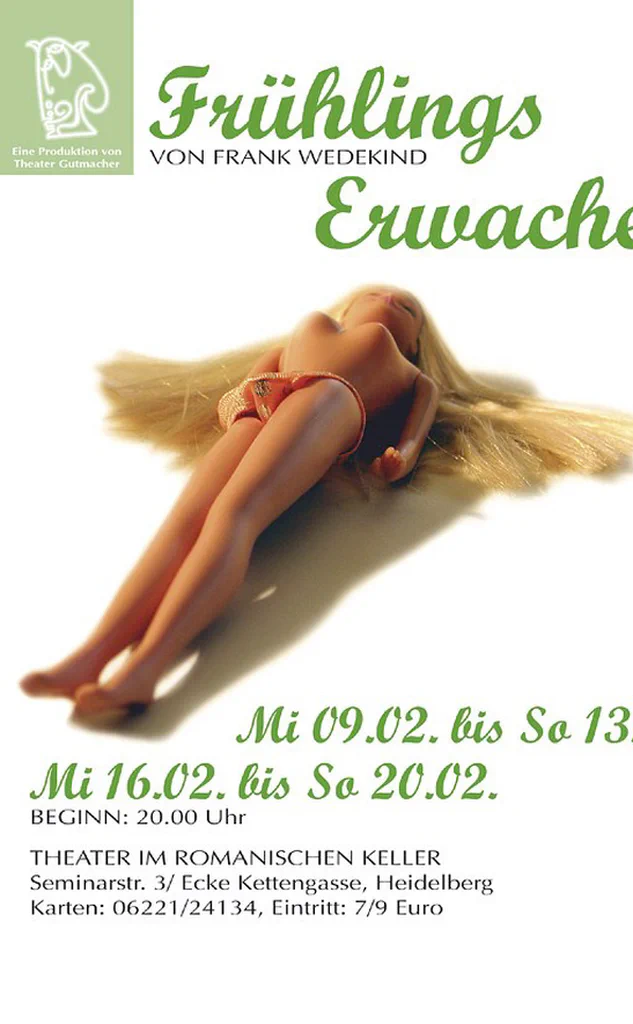Theater Gutmacher plays Wedekind’s “Spring Awakening” in the Romanischer Keller
Towards the end of 2004, I applied to join the Heidelberg theatre group “Gutmacher”. The latest production of Wedekind’s “Spring Awakening” was being rehearsed and the role of Melchior’s conservative father was still to be cast.
Even though this was only one of the smaller roles, we had quite intensive rehearsals over several months. Once again, it was exciting work that culminated in ten successful performances in February 2005.
Due to its great success, we performed the play again in autumn 2005 in the Romanischer Keller in Heidelberg.
Article by Carmen Bürk, published as a press release by Heidelberg University:
Death is seductive: “We know that everything people do and strive for is stupidity, and we laugh about it. We are content with ourselves.” This is what the ghost says about the schoolboy Moritz Stiefel, who couldn’t come to terms with life and blew his head off in the confusion of puberty. Now, in a billowing shroud and with his head under his arm, he wants to drag his best friend, Melchior, to the grave with him. He feels guilty about the death of 14-year-old pregnant Wendla, who died as a result of an abortion arranged by her mother. Torn between his feelings, only a masked, cheerful woman can prevent the pact with death at the last second.
This scene in the cemetery is the most impressive of Frank Wedekind’s children’s tragedy “Spring Awakening” at the Gutmacher Theatre in the Romanisches Keller. Matthias Paul uses few but striking means and a great love of detail to make the episodes of this youthful curiosity and despair flare up like the flames of the lighters in whose glow Moritz and Melchior talk to each other about shame and “male impulses” as well as remorse and fear of death.
In very calm changes of scene, he leads us to the realisation that none of this should have happened. At the same time, he takes his cue from the period around 1890, when Frank Wedekind became as famous with this work as he was persecuted by the censors. As an “unheard-of outrage”, “Spring Awakening” had no chance of being performed on stage until 1906. Today, the narrow-mindedness and prudery of the educators, especially Wendla’s mother’s false shame, seem rather outdated and ridiculous. The male arrogance and pathos at the school could have been made even more grotesque.
The play is carried by the young “heroes” in particular. Kathrin Müller plays the consistently naïve young Wendla, who seeks answers, if not from her pious mother (Karin Schmurr), then unfortunately with disastrous consequences from her peers. Oliver Kalkbrenner plays Melchior as a stable teenager who confidently and sensibly offers his best friend Moritz help. The fact that this well-intentioned help plunges Moritz into even deeper despair is due to his uncomprehending parents and teachers, whose various quirks reflect the image of society at the turn of the century. Folke Wolff, for example, fails as Melchior’s liberal and clever mother because of her conservative husband (Andreas Tusche). The most rewarding role is that of Moritz Stiefel, in which Leif Schmitt mostly broods on stage as a completely overwhelmed boy with slumped shoulders. He grows to acting greatness as Death, where he babbles devilishly seductively about the wretchedness of life, as if it were revenge for what he has been granted. Fortunately, there is Stephanie Frick, who first as the cheerful Ilse and finally as the hooded woman proves how beautiful and carefree life can be in contrast to death.


